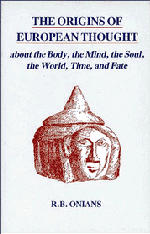Book contents
- Frontmatter
- Contents
- Preface to the first edition
- Preface to the second edition
- Introduction: The Earliest Greeks
- PART I THE MIND AND THE BODY
- PART II THE IMMORTAL SOUL AND THE BODY
- PART III FATE AND TIME
- Chapter I ‘On the Knees of the Gods’
- Chapter II Πείρατα
- Chapter III Καιρός
- Chapter IV The Weaving of Fate
- Chapter V Other Peoples—Fate and Magic
- Chapter VI Μοῖραν ἐπιτιθέναι, πεπρωμένος, etc.
- Chapter VII ʿΥπὲρ μόρον and the Relation of the Gods of Fate
- Chapter VIII The Jars of Zeus, the Scates of Zeus, and the Κῆρες
- Chapter IX Time—Ἦμαρ
- Chapter X Lachesis, Klotho, and Atropos
- Chapter XI Phases of Body and Mind, Sorrow, Sleep, Death, etc.
- Chapter XII Τέλος
- ADDENDA
- Indexes
- Frontmatter
- Contents
- Preface to the first edition
- Preface to the second edition
- Introduction: The Earliest Greeks
- PART I THE MIND AND THE BODY
- PART II THE IMMORTAL SOUL AND THE BODY
- PART III FATE AND TIME
- Chapter I ‘On the Knees of the Gods’
- Chapter II Πείρατα
- Chapter III Καιρός
- Chapter IV The Weaving of Fate
- Chapter V Other Peoples—Fate and Magic
- Chapter VI Μοῖραν ἐπιτιθέναι, πεπρωμένος, etc.
- Chapter VII ʿΥπὲρ μόρον and the Relation of the Gods of Fate
- Chapter VIII The Jars of Zeus, the Scates of Zeus, and the Κῆρες
- Chapter IX Time—Ἦμαρ
- Chapter X Lachesis, Klotho, and Atropos
- Chapter XI Phases of Body and Mind, Sorrow, Sleep, Death, etc.
- Chapter XII Τέλος
- ADDENDA
- Indexes
Summary
Pindar's πολλῶν πείρατα συντανύσαις, κ.τ.λ. began καιρὸν εἰ ϕθέγξαιο. καιρός is supposed to mean ‘due measure’, ‘fitness’, ‘opportunity’, etc. But, if we look to the early evidence we shall find reason to believe that it is not a mere abstraction. It never occurs in Homer, only once in Hesiod: καιρὸς δʾ ἐπὶ πᾶσιν ἄριστος, from which little can be inferred. But Pindar and the tragedians have many instances, some vague like Hesiod's and some more instructive. Thus Pindar says ‘I have lighted upon many themes, hitting the καιρός with no false word (καιρὸν οὐ ψεύδει βαλών)’, and in the Agamemnon, after the fall of Troy, Aeschylus says that Ζεὺς ξένιος (against whom Alexander = Paris had offended) has taken vengeance
ἐπʾ ʾΑλεξάνδρῳ
τείνοντα πάλαι τόξον, ὅπως ἄν
μήτε πρὸ καιροũ μήθʾ ὑπὲρ ἄστρων
βέλος ήλίθιον σκήψειεν,
and Euripides speaks of men ‘aiming the bow beyond the καιρός (τόξον ἐντείνοντες…καιροũ πέρα)’. It is clear that καιρός meant something like ‘mark, target’. This could not arise out of a sense ‘due measure’ or ‘opportunity’. On the other hand ‘mark’, while it may explain the use approximating in significance to ‘due measure’ as in our ‘wide of the mark’, ‘overshoot the mark’, etc., will explain neither ‘opportunity’ nor the use by which Euripides refers to a part of the body where a weapon can penetrate to the life within (above all, within the head) as a καιρός, speaking of a man as εἰς καιρὸν τυπείς, ‘struck in(to) a καιρός’.
- Type
- Chapter
- Information
- The Origins of European ThoughtAbout the Body, the Mind, the Soul, the World, Time and Fate, pp. 343 - 348Publisher: Cambridge University PressPrint publication year: 1988



